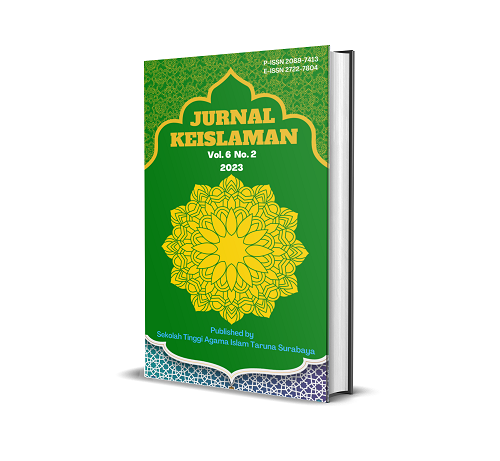Kebijakan Moneter dalam Presfektif Ekonomi Islam Pada Pembangunan Ekonomi
Abstract
Islamic economics is required to be able to contribute to the global economy. This paper aims to analyze monetary policy in the perspective of Islamic economics in view of the country's economic development. Monetary policy is a branch of economics that influences the country's economy. Monetary in Islam not only emphasizes the supply and demand for money, but also the principle of equity, equality and creating a fair distribution of wealth and income. This study uses literature studies, namely theoretical studies and references related to values, culture and norms that develop in the social situations studied. In this research, the writer chose to study literature or study literature by collecting reference books related to research. This research study is the implication of Islamic monetary policy on economic development in Indonesia. Monetary policy can maintain economic stability by balancing the amount of money in circulation widely and in balance. If any money in circulation is greater or less than a number of goods and services, then the economy in a country will have a negative impact.References
A. Karim, Adiwarman, Ekonomi Makro Islami, Jakarta : PT Raja Grafindo Persada. 2007.
Ajuna, Luqmanul Hakiem. 2017. Kebijakan Moneter Syariah. Jurnal Al-Buhuts Vol.13, No. 1.
Aisyah, S., & Nurmala, S. (2019). Aktualisasi kebijakan moneter islam dalam permasalahan makro ekonomi islam. Syariah, 7(2).
Chapra, M. Umer, 2000, Sistem Ekonomi Islam. Jakarta: Gema Insani.
Dini Abdianti, Anisa Restu, Sholahuddin Al Ayyubi, Faisal Hidayat (2023), Konsep Kebijakan Moneter dalam Presfektif Ekonomi Islam, Trending: Jurnal Ekonomi, Akuntansi dan Manajemen Vol. 1, No. 3 Juli 2023 e-ISSN: 2962-083X; p-ISSN: 2964-531X, Hal 213-226
Luqmanul Hakiem Ajuna, “Kebijakan Moneter Syariah,†Jurnal Al-Buhuts Vol.13, No. 1
Latifah, Nur. 2015. Kebijakan Moneter Dalam Perspektif Ekonomi Syariah. Jurnal Modernisasi Vol.11, No. 2
Munawar Iqbal dan M. Fahim Khan, A Survey of Issues And Programme For Reseacrh In Monetary And Fiscal Economics of Islam (Jeddah: ICRIE King Abdul Aziz University, 1981) h. 19-21
Mulyani, Sri. 2020. Uang Dalam Tinjauan Sistem Moneter Islam. Al-Iqtishad: Jurnal Ilmu Ekonomi Syariah Vol.2, No. 1: 52–67
Muhammad, Kebijakan Fiskal dan Moneter dalam Islam, (Jakarta: Salemba Empat, 2014
Nanang Sobarna, “Kebijakan Moneter dalam Ekonomi Islamâ€, Jurnal Ilmiah Manajemen dan Ilmu Sosial. Vol. 1, No 2, Juni 2019. http://repository.ikopin.ac.id/235/1
Purwanto, H. (2017). Kebijakan Pengendalian Moneter di Indonesia dalam Perspektif Perbankan Syari‟ah. Syariati : Jurnal Studi Al-Qur’an Dan Hukum, 3(01), 103–118. https://doi.org/10.32699/syariati.v3i01.1146
Safuridar, “Peranan Instrumen Kebijakan Moneter Terhadap Pertumbuhan Ekonomi di Aceh†Jurnal Samudra Ekonomika, VOL.2, NO.1, April 2018.
Sugiyono. (2017). Metode Penelitian Kuantitatif, Kualitatif, dan R&D. Bandung : Alfabeta, CV
Wahyudi, A. (2013). Kebijakan Moneter Berbasis Prinsip -Prinsip Islam. Justicia Islamica 10 (1). https://doi.org/10.21154/justicia.v10i1.142
Zsasa Aulia Hubara, Surya Alfi Nurrahma, Nurul Jannah, “ Penerapan Kebijakan Moneter Islam pada Sistem Perekonomian Indonesia, Journal Of Management, Accounting, Economic dan Business, Vo. 02. No.04, 2021. http://trianglesains.makarioz.org
Copyright (c) 2023 Dewi Maharani

This work is licensed under a Creative Commons Attribution-ShareAlike 4.0 International License.
Authors who publish with this journal agree to the following terms:
- Authors retain copyright and grant the journal right of first publication with the work simultaneously licensed under a Creative Commons Attribution-ShareAlike that allows others to share the work with an acknowledgement of the work's authorship and initial publication in this journal.
- Authors are able to enter into separate, additional contractual arrangements for the non-exclusive distribution of the journal's published version of the work (e.g., post it to an institutional repository or publish it in a book), with an acknowledgement of its initial publication in this journal.
- Authors are permitted and encouraged to post their work online (e.g., in institutional repositories or on their website) prior to and during the submission process, as it can lead to productive exchanges, as well as earlier and greater citation of published work (See The Effect of Open Access).






















